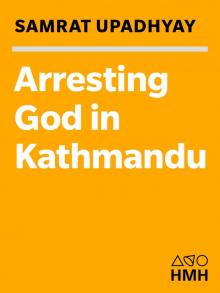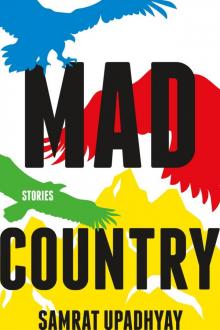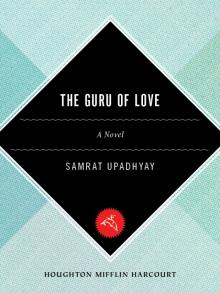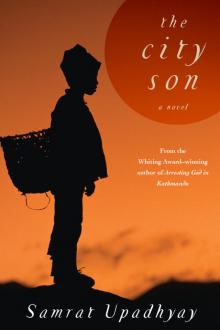- Home
- Samrat Upadhyay
Arresting God in Kathmandu Page 3
Arresting God in Kathmandu Read online
Page 3
One winter morning, when the city was waking up, a young man, holding a recommendation letter, knocked on Acharya’s door. “I hope I’m not intruding, sir,” he said nervously, regarding the poet with reverence. “My name is Giri.” Acharya invited him to his study and did his best to make him feel welcome. Giri was a short, thin man, with a tuft of black hair hanging over his forehead. His face was delicate, with an aquiline nose that could only belong to a Brahmin, and his eyes were large, with long eyelashes. His face made Acharya think of men who live under the strong influence of their mothers.
After Acharya’s wife, Durga, brought in a tray with tea and biscuits, Acharya extended his hand and requested the young man’s portfolio.
It contained an epic, running nearly seventy pages, about a young man’s passion for his lover (nothing new there), but the poet had taken Lord Bhima, one of the five brothers of the Mahabharata, and turned the strongman into a jealous and passionate lover. In the poem, Lord Bhima was obsessed with Draupadi, the wife who had been bestowed on all five brothers. Lord Bhima’s wish to have Draupadi all to himself disrupted the harmony among the brothers, who, in the myth, were known for their loyalty to one another. Giri’s control of the verse was so flawless, his characters so believable (despite the ironic twist of the old text), that Acharya found himself transported back to the era of the Mahabharata, with its clanking armor and noble warriors, its beautiful demure women and royal gardens, thundering skies and the gods’ frequent interference in men’s affairs.
When, after a long time, Acharya lifted his eyes from the final page, Giri was looking up at the large oil painting of the past kings of the country.
“How long have you been a poet?” Acharya asked, clearing his throat.
Giri jumped as if he’d been caught stealing.
“That is my only work, sir,” he said. “About half a year.”
Surely he is lying, Acharya thought. Such precision of language comes after years of practice, only after the technique becomes second nature to the poet so that his pen can plumb the depths of meaning.
“You must read.”
“Occasionally, when I can take time from my college work.” Giri had a guilty look.
Acharya noticed the curtains moving softly in the wind. “You have potential.”
“Thank you, sir,” Giri said.
“We could work together,” Acharya said. They would meet every Saturday in his study, and Giri would present his work, which Acharya expected to be substantial.
Giri was obviously overwhelmed, for he kept saying, “Thank you, sir. You’re so kind, sir.”
After escorting Giri to the main entrance, Acharya went to his study and read the entire work again, this time with a critical eye. But the poem was almost flawless. For a brief moment, he was anxious. What could he teach this gifted man?
At the academy, Acharya could not stop talking about Giri’s epic, surprising his colleagues, who had rarely heard him speak such praise.
“He is a genius,” Acharya said in the canteen over a cup of lemon tea. He was startled by his own assertion.
“Then we should publish him,” said one of the men who supervised the printing press in the basement.
“No, no, no.” Acharya shook his head. “He needs time. One more year.” He looked around the table and saw his colleagues nodding solemnly, although Acharya knew they were more interested in promoting themselves than some young novice who had taken a fancy to poetry. Later, the conversation changed to politics, but Acharya found himself thinking of Giri’s poem, and he started humming an old song to himself, distractedly, like a man so overwhelmed by a new discovery that he cannot concentrate on anything else.
When Giri arrived the next Saturday, Acharya was playing with one of his grandchildren on the lawn, while his elder daughter, visiting for the weekend, watered the flowers. Durga sat in a white plastic chair, knitting. His son—who was about Giri’s age and was studying engineering—and the younger daughter had gone to the temple. The winter sun warmed Acharya’s back.
“Come in, come in,” Acharya shouted when he saw Giri standing hesitantly at the gate, as if afraid to break into this family scene. “Make yourself comfortable; don’t be shy,” Acharya said. “Consider yourself family.” He had never before offered such hospitality to a pupil, and he detected a note of awkwardness in his voice.
After the formalities were over and Acharya had read Giri’s new poems, he once again found himself transported—flying, weightless, over the crowded streets and alleys that these poems described. When he finished reading, Acharya could feel himself smiling. “This is good,” he said, trying to calm his excitement.
“Thank you, sir.” Giri looked at him anxiously, waiting for the real criticism.
“You could polish your imagery,” Acharya suggested, and launched into a long discussion of the poems. Every time he pointed out a small flaw or an area that could be improved, he became unsure of himself. These were minor criticisms, and he was not confident that any changes would necessarily improve the poems. In fact, the minor faults seemed to add dimension rather than lessen it.
After Giri left, Acharya, tired, stared at his empty chair. His daughter came to his side and said, “Is something wrong, Papa? You don’t look well.”
Acharya shook his head. “Such talent . . . so young.”
That night, sitting at his desk and reading a colleague’s poems, he was suddenly inspired to write an epic. A major undertaking, but a worthwhile one. As a young poet he had written a book-length poem that he considered a failure, though it was still studied in higher-level classrooms. Now seemed an appropriate moment to undertake another such venture; he had experience—both in poetry and in life. Moreover, he was not oblivious of his advancing age. The previous year he had suffered heart palpitations; lately, he had experienced back pains, to the concern of his family and friends. One colleague had given him a special chair, which sat, unused, in a corner of his study. Yes, this would be the right moment for an epic, perhaps the last major work he would write.
Acharya, excited at the prospect, could no longer concentrate on the poems before him. Resolved to begin his epic the next night, he turned off the light in his study and went to bed. But he didn’t fall asleep for a long time; he lay there listening to frogs croak outside and thought about his epic. He tried to come up with a central image that would define the poem, but he was distracted by Durga’s faint snoring.
Then, at some point during the night, Acharya awoke from uneasy dreams with a nagging pain in his back. He decided not to wake Durga. His throat was parched, but even after finishing the water in the jug by the bed, he was thirsty, and he went to the kitchen. He could feel the cold water he drank reach his stomach. As he headed back to the bedroom, almost as an afterthought he went to his study, switched on the lamp, and took the copy of Giri’s epic from the shelf. He read it again, slowly, noting the juxtaposition of certain words, discovering with each breath the subtle rhyme patterns.
He had no idea how long he’d been standing by the lamp when he saw Durga in the doorway, her stout body like a ghost in the gray light.
“A good poet, is he?” she asked, looking at him curiously, her eyes puffed from sleep.
“Hmmm,” said Acharya, somewhat embarrassed.
“The world is changing,” Durga said. “A good night’s sleep should clear your mind.”
Not receiving any response, she went back to bed, and, after a short while, Acharya followed her.
Giri’s visits to the house became more frequent. Sometimes he appeared soon after dawn, carrying fresh tomatoes, cauliflower, or radishes in a bag. Every time he came, he stood at the door uncertainly, as if he were not sure of his status with the family since his last visit. Durga became fonder of him with each visit. “Any mother would be proud to have such a son,” she often said to her husband, who, although pleased to see Giri, was not comfortable with such rapid family intimacy.
Giri often spent time in the kitchen, helping Durga co
ok the afternoon or evening meal, tasting the egg curry or fried okra, suggesting new recipes. Acharya’s son, the one studying engineering, started to call him the Cooking Poet. “Is this how you cook your poetry, Giri? Fry everything in clarified butter, a little coriander here, a little basil there?” Giri’s face turned crimson at the teasing, and he barely lifted his gaze from the onions he was chopping or the squash he was stirring. It was as if a new child had entered the house. Acharya suspected that his daughter, who was barely eighteen, was developing a crush on Giri, for in his presence her normal haughty, impatient ways disappeared, and she acted demure.
Through conversations he overheard and tidbits he gathered from Durga (he never questioned the young poet directly about himself), Acharya pieced together, like a jigsaw puzzle, Giri’s life outside his poetry. His father had died at an early age, and Giri had been raised by his mother (here Acharya congratulated himself on his earlier intuition) in a village outside the city. He had a younger sister, who was mentally retarded and lived with the mother. And he had a scholarship that paid for his college expenses and kept him from starving—“such a hard life for a young boy,” Durga declared. And he was a member of the United Democratic Front, the growing ultra-left group that demanded changes in the country’s power structure. This last bit of information came as a surprise to Acharya, who perceived Giri’s radical politics as incongruent with his personality. The few members of the UDF he had met or seen in colleges had a brazen attitude hinting at mania. He had been unable to comprehend them. Yet here was Giri, who cringed before a raised eyebrow.
Occasionally Giri missed his scheduled weekly appointment and then turned up the following Saturday with the bag of vegetables, again looking uncertain. Acharya would scold him for not keeping the appointment, and Giri would apologize and say that he had had to arrange for a “meeting.” Acharya would shake his head, thinking, Your commitment should be art, not politics. But once he’d read Giri’s new poems, he would feel foolish, because they were as good as ever.
Acharya arranged for Giri to present a reading at the academy. “Just wait,” he told his colleagues. “This one is of a different breed.” On the day of the reading, Acharya and Giri sat in the back of the car for a last-minute consultation, while Acharya’s son drove and Durga and their daughter sat squeezed together in the front. Giri had oiled and neatly combed his hair, which made him seem even younger. He looks like a child, Acharya thought as the car pulled into the academy compound.
Before the reading started, Acharya restlessly roamed about the auditorium, checking to see whether the microphone was working, greeting a colleague he hadn’t seen for some time, reprimanding his daughter for her breathless questions about Giri. When Giri walked to the podium, Acharya went to the back of the sloped auditorium so that he had to look down at the stage. The members of the academy were seated at the front, but he did not wish to sit among them lest their faces distract him. After the introduction, Giri, his soft face white under the bright lights, thanked Acharya, without whose guidance “I would not be privileged to stand humbly before you today.” Then he began to read, hesitantly. The faint tremor in his voice reminded Acharya of the first reading he himself had given on the same stage, although the auditorium was nowhere as large as it was today.
By the third poem, the auditorium was filled with silence. Giri read with more enthusiasm, occasionally lifting his hand in an awkward gesture or raising his eyes from the pages to see the audience in the darkened room. Acharya noted the attentive faces of the people around him. Rarely had he felt such pride; at the same time, a restlessness swept over him. He could not concentrate on Giri’s words, though the poet’s small frame on the brightly lit stage was intensely clear, even from a distance; it was as if Acharya were looking through a telescope. He felt that Giri needed protection, although from what, he did not know.
His reverie was broken by the applause that followed the end of the reading. Giri walked all the way up the aisle to touch Acharya’s feet in homage. Acharya pulled him up and embraced him. His colleagues came over and congratulated him on his “new discovery” and patted Giri on the back. Amid all the congratulations, Acharya suddenly wanted to leave.
Often when Acharya sat down to write, he was beset by anxiety. His epic was not going well; that was certain. And he started to doubt the quality of his past work. He went through most of his poems and found them lacking. Even the one about the parrot, which had propelled him to fame, now seemed simplistic and self-conscious. Giri’s epic loomed above him as the ideal.
Acharya’s study became littered with writings violently crossed out, much to the chagrin of Durga, who, after she first saw the discarded papers, said, “Perhaps we should go on a pilgrimage, no?” Acharya impatiently waved her off, annoyed by the thought that religion would solve his writing problems. The more lines he crossed out, the more urgent was his compulsion to write. His back troubled him more frequently—a searing pain extended to his neck—and he found himself using that special chair in the corner.
During his renewed consultations with Giri, Acharya found more faults with the young man’s poems. “Here, here, how can you do this?” he once shouted shrilly, and saw Giri’s startled expression. Acharya regretted his outburst; after all, Giri was a novice and had to be treated gently. Giri averted his eyes and said, “Sorry, sir, sorry.”
Sometimes Acharya despised Giri for accepting the humiliation and wished he were not so sensitive to criticism. A man does not become a poet in a day, he repeated, sometimes to himself, sometimes to Durga, who looked so worried that he became irritable. Once when he confided to a friend, “I cannot write anymore,” he felt weak, and the friend suggested he take a vacation in India—perhaps a pilgrimage.
Frost covered the city as winter reached its peak. For three weeks, Giri did not show up for his appointment, and Acharya grew worried. He sent his son to Giri’s home, but the son reported that Giri had left the city to join a rally in another part of the country. Acharya felt slighted.
The news of the shooting and the subsequent announcement of the names of those who died came one afternoon when Acharya’s family was gathered on the lawn, enjoying the warmth of the winter sun. The radio buzzed on the windowsill and they heard the name: Giri Kumar Rizal. Acharya’s son ran to the radio and turned up the volume. Shooting had broken out at a protest march in Bhairaba, and among the bodies was that of Giri Kumar Rizal. Durga let out a muffled scream, which seemed to get stuck in the air as the voice on the radio listed more names. Acharya’s daughter put her hand to her mouth and ran inside, slamming the door behind her. His son stared at the radio even though the government broadcaster had moved on to other news. Acharya sat down on his chair with a thump, but he was not thinking of Giri. He was thinking of one of Giri’s powerful verses.
The complete account of the shooting came to Acharya in pieces, as did the story of Giri’s life outside his poems, from men who had been at the rally and others who had secondhand information. The protest had turned into a fistfight between the United Democratic Front and the rival party. Giri, trying to break up the fight, had appealed for a united protest against the government at the very moment that someone had fired a pistol blindly into the crowd. Later, the police found the bullet lodged in Giri’s throat. Meanwhile, in the pandemonium, police had begun shooting at the crowd.
Death hung in the corners of Acharya’s house for several days, especially in the kitchen, where Durga said she felt Giri’s presence. The daughter was hit the hardest; for a number of days, she didn’t eat properly, and her eyes would fill with tears whenever Giri was mentioned. But after a while things returned to normal. Durga once more referred to Giri by the name her son had given him, the Cooking Poet—“Poor Cooking Poet, my kitchen feels empty without him”—and soon they recalled him only occasionally, mostly when they were cooking in the kitchen. Once Acharya’s daughter said solemnly, “I loved his poems,” although she had never read them.
For a few weeks Acharya was wrapped
in confusion; he did not know how to adjust to Giri’s death. It was like waking up from a long afternoon nap and finding that you had been robbed. Colleagues consoled him, for they knew he mourned for his most prized pupil.
Acharya thought of the shy man who turned red when admonished and repeated, “Sorry, sir, so sorry.” He regretted having been critical of Giri’s work. Had his poems really become less effective, or had Acharya’s disapproval of Giri’s political involvement distorted his appreciation of Giri’s work? After all, Giri had lived a dual life, and his political self had prevented Acharya from understanding Giri’s true nature. The more Acharya thought about this, the more he remembered his own youth: the protest marches he’d participated in, the madness that overtook the crowd when it demanded the return of the proper heir to the crown, the days he’d spent in jail with common criminals, creating lines of poetry in his mind and committing them to memory. Acharya, looking at himself in a mirror, could not connect those memories of the young poet with the reflection in front of him, the body slouching from back pain, doubt creeping into the lines of his face.
When winter gave way to spring and leaves started sprouting on the branches, Acharya, in fits and starts, went back to work on his epic. Giri’s file still lay on his shelf, gathering dust. It had acquired a certain aura, like that of classical texts one treasured but hesitated to open lest they let out some old ghost. Now when Acharya thought of Giri, the image he summoned up was one he had, in fact, never seen: Giri appealing to the two fighting factions, a hand from the side raised in air, holding a gun, and Giri’s throat split open by the bullet, blood gushing forth and splattering the men around him.

 Arresting God in Kathmandu
Arresting God in Kathmandu Mad Country
Mad Country The Guru of Love
The Guru of Love The City Son
The City Son